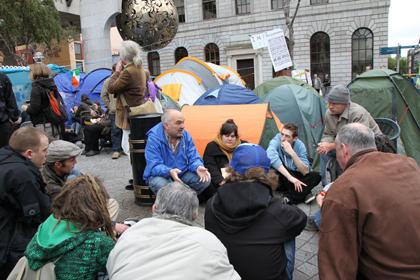Another education is possible: alternative educational institutions in Dublin’s social movements

Harry Browne at Occupy University
Recently a number of educational projects linked to social movements have emerged in Dublin. The three described here are Occupy University, the Provisional University and Praxis. All three share not only a critique of the neoliberalisation of higher education but, perhaps more importantly, a commitment to re-appropriating education by engaging in autonomous or independent educational activities outside of the university context. Rather than limiting themselves to the critique of the existing university each of the three projects is an experiment in creating alternatives.
Moreover, the alternatives developed are directly linked to social movements and, in the case of Praxis, community activism. This has created an interface between research and teaching, which all too often remain within the university, and activism. The mutual engagement with takes place makes for a more egalitarian, inclusive and politicised education as well as strengthening social movements.
Occupy University
Occupy University, unlike the others, was very much an ad hoc development, emerging as a response by a number of university-based activists to the sense of possibility that accompanied the beginning of the Occupy Dame Street movement. Despite being the youngest and most improvised of the three projects, OU has hosted over 77 talks, discussions and workshops outside the central bank, making it one of the most consistent fixtures at Occupy Dame Street. OU revealed, certainly to myself as a younger activist, the existence of a layer of researchers and teachers anxious to make a connection with social movements. In the context of the overwhelming challenges we face today, not to mention the economic mystification and ideological saturation we encounter in the mainstream media, creating spaces for critical education takes on a sense of urgency. Since the first OU discussion on 11 October, there has been a public space on the streets of Dublin were people could discuss ‘taboo’ topics, such as taxing wealth, the critique of representative democracy or the role of civil disobedience. Recently, as their first semester came to a close, OU have begun discussing future projects. Some of these may include more focused themes around which to organise events, a greater focus on intervening within the university, and the creation of spaces of reflection in and for the occupy movement.
Some reflections on the OU so far can be found here.
The Provisional University
The Provisional University emerged following a series of seminars which took place in early 2010, after which some of the participants came together to create a more permanent project. They were motivated by what they describe as the ‘crisis of the university’. This crisis involves the proliferation of bureaucratic mechanisms limiting independent research and teaching and the commercialisation of knowledge linked to the new relationship between the production of knowledge and capitalism. Against both bureaucracy and capital, the Provisional University aims to create a ‘commons’ in the sense of a process in which the universal and collective dimension of knowledge is supported in a way which challenges both state and market, in this sense opening up possibilities beyond the public/private divide. Concretely, they have organised discussions and seminars on everything from political economy to community development. Their activities take place within social movements (e.g. Seomra Spraoi) and the university. The PU also produce a certain amount of research and run the University In Crisis blog. They hope to focus on research over the coming months. The PU also participates in the Knowledge Liberation Front, a European network of autonomous education, mainly active in France and Italy and linked to the Edu-Factory collective.
PRAXIS
Praxis is a project bringing together community activists and radical educators that focuses on the possibilities of popular education in challenging the existing model of formal education. Drawing on the work of Paulo Freire, as well as feminist practices of conscientisation, Praxis believe that drawing on experiences of oppression and exploitation can facilitate a form of education that challenges the dominant and all too pervasive ideological consensus. Praxis works within the context of marginalised communities and some of its participants have years of experience in terms of community activism. This has a particular importance given that the radical social movements, in which projects like the OU and the PU are based, have a very limited capacity to intervene in these communities. However, the politics of community, and even more so community development, presents its own challenges, in response to which Praxis are developing analyses and strategy. Over the coming semester Praxis will focus on continuing their current learning circle and establishing further circles as well as developing their idea of a ‘Communiversity’. They are also interested in alternative economic models of organisation, such as cooperatives.
For a comprehensive discussion of the type of euducational politics envisioned by Praxis, check out Margaret Crean’s paper available here. {jathumbnailoff}
Image top: David Johnson.
